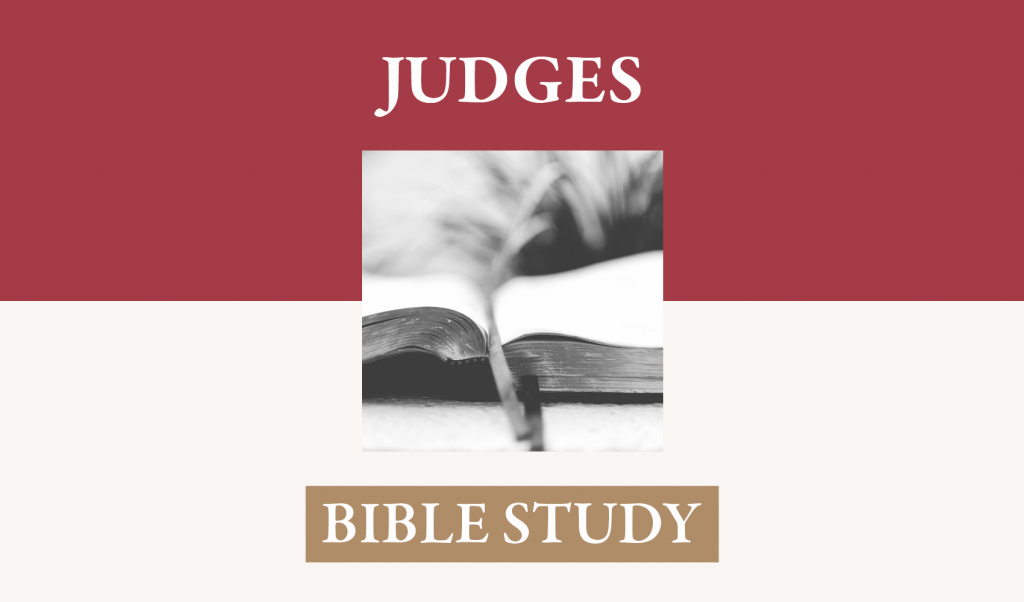INTRODUCTION AND BACKGROUND: The book of Judges demonstrates the need for God’s people to submit wholly to his Lordship and follow him obediently. Failure to follow the Lord obediently leads to judgment, as the Lord revealed to Moses. In fact, the book argues toward the end, God’s people needed a strong, godly leader to direct them. The vacuum of leadership contributed toward a culture in which “everyone did what was right in his own eyes,” (21:25). Despite Israel’s failures, though, God was gracious and faithful to his people.
The story of Gideon falls within the cycle of sin, punishment, and deliverance the author of Judges used to teach these lessons about God and about his people. In this cycle, the oppressors are the Midianites, Amalakites, and Qedemites, though Gideon deals specifically with the Midianites. Gideon himself was from the town of Ophrah in western Manasseh—the portion of Manasseh found within the Promised Land. The Midianites were distantly related to the Israelites since both peoples had Abraham as an ancestor (they were descended through Keturah, his concubine after Sarah’s death). This connection did not stop them from dominating Israel, however.
The story of Gideon teaches God’s people about an important facet of faith. The author of Hebrews stated plainly that “without faith it is impossible to please God.” Through Gideon’s story, the author demonstrates that faith requires believing in God’s power and faithfulness despite our own weaknesses. God is strong enough and faithful enough to use us to accomplish his purposes, no matter what our failings are. Perhaps this can be demonstrated best by considering the instances in the text of Gideon’s failure and contrasting them with the examples of God’s strength, faithfulness, and grace.
GIDEON’S WEAKNESS DEMONSTRATED:
He doubted and questioned the Lord at the angel’s appearance. During a time of great oppression at the hands of the Midianites, the Angel of the Lord appeared to Gideon and announced that God is with him and called him a mighty warrior. The text does not give any indication that Gideon has demonstrated battlefield prowess in the past, and considering how miserable the oppression in and around the Jezreel Valley (where Gideon’s hometown was located) was because of Midian, one would have to wonder if anyone in the territory of Manasseh could be considered a mighty warrior at that point. The angel asserted that God was with Gideon, and seems to have informed Gideon that this would make him a mighty warrior. Despite what Gideon had done or failed to do in the past, God’s presence and blessing would empower Gideon to do mighty things. Despite this wonderful assertion by the Angel of the Lord, Gideon questioned the reality of God’s presence (6:13), as if to say, “You say God is with me, but I’m not seeing it.” In response, the Angel spoke very directly, “Go . . . . Am I not sending you?” Gideon then responded by questioning the second aspect of the Angel’s message: not only the promise of God’s presence, but also the assertion that he would be mighty. In verse 15 Gideon gave his best argument against the angel’s assertion—I am nothing. It is easy for us to sympathize with Gideon because, like him, we are weak. We are nothing. But when God makes a promise to act through us, our weakness no longer becomes a relevant factor. Gideon had no reason to doubt the Angel’s words, and yet he did so twice.
He was unwilling to tackle idolatry openly. One unique feature about Gideon’s role as deliverer is that God actually used Gideon to tackle the problem of idolatry directly. Judges 2 informed us that idolatry was a major spiritual problem in Israel, and yet in a number of the deliverance stories in Judges (Othniel, Ehud, Barak & Deborah, Jephthah, and Samson), the deliverer seems to have no role in attempting to eliminate idolatry from the land. Gideon is an exception. The town of Ophrah, Gideon’s hometown, possessed an altar to Baal and an Asherah pole. Chapter 6, verse 25 informs us that the altars belong to Gideon’s own father! God commands Gideon to tear it down and build and altar to him instead. This was a critically important job because idolatry was a serious spiritual problem. Gideon responded positively. He did what God commanded, which demonstrates that he believed that God’s holiness and glory were important. Gideon was unmistakably a man of faith. He cared that God should be worshipped the right way. He desired to honor God and to see other people honor God as well. He would not, however, fulfill his calling openly. He tore it down at night in secret, showing that while he feared the Lord, he also feared people. Such an action seems foolish in retrospect, because Ophrah could not have been a large community, and one has to reason that eventually everyone would know who was responsible. How do you expect to get away with something like that? But Gideon attempted it anyway because he was afraid of what people might say or do.
He persistently doubted the Lord. Even after the Lord made His will clear to Gideon in the Angel’s appearance, had shown patience with Gideon by waiting around for Gideon to offer a sacrifice (6:19-21), and had protected Gideon from the wrath of his neighbors (6:31-32), Gideon still lacked confidence in God’s call. For this reason, he proposed to the Lord the idea of laying out the fleece at night. Many believers consider this passage an example of how to pray for clarity regarding God’s will—ask for a specific sign from God. However, the author of Judges is not lifting up Gideon as a shining example of how to discover the will of God. Gideon did not need any additional clarity about God’s will. The Angel of the Lord had already said, “Go. . . . Am I not sending you?” Laying out the fleece was completely unnecessary. The only reason Gideon lacked confidence was because he was unwilling to believe that God’s power could overcome his own weakness.
Gideon had a difficult time overcoming his fear and feeling of inadequacy. He clearly desired to follow the Lord, as is demonstrated by his willingness to remove his father’s idolatrous shrine and assemble an army for the Lord, but he was handicapped because he would not put his full confidence in God’s strength.
GOD’S STRENGTH, FAITHFULNESS, AND GRACE.
By contrast, God demonstrates that both willing and able to work through Gideon, in spite of Gideon’s weakness.
He called Gideon. By Gideon’s own admission (6:15), he was nothing special. He was from a weak family and was the youngest in his household. We have no record to indicate that Gideon had distinguished himself in any way prior to the Angel of the Lord’s appearance in verse 11. And yet God definitively chose Gideon. No mistake. God determined to make Gideon into a mighty deliverer. God is faithful to his people, loves his people, and is determined to work on behalf of them to save, to deliver, to rescue. And he works in such a way as to demonstrate his own sovereign power. God does not need the mighty, the strong, the successful, or the prominent in order to do a mighty work. As Paul taught the Corinthians, “But God chose what is foolish in the world to shame the wise; God chose what is weak in the world to shame the strong,” (1Corinthians 1:27). Our shortcomings are not a barrier to God.
He was willing to follow through with Gideon’s requests. God was incredibly patient with Gideon. After the Angel of the Lord had clearly revealed that God favored Gideon, the son of Joash still requested a sign of favor (6:17). The Lord graciously endured the request. The Angel stayed and received Gideon’s gift. The Lord was again patient with Gideon as the army gathered. Even after successfully gathering an army from several northern tribes, Gideon still sought reassurance. As ridiculous as the fleece request was, God patiently honored the request. We serve a God who is patient with us way beyond what we could ever deserve. If He were not patient with us, we could never serve Him, but thanks be to God that He is!
He raised up Joash to stand up for Gideon. Despite Gideon’s fear, God did not let the men of Ophrah harm Gideon for destroying the idolatrous shrines. Ironically, Gideon’s father Joash is the one who stood up for him. Joash is the one who owned the shrines, but God used this idol worshipper to protect the one who destroyed the idolatrous shrines. Gideon had no reason to fear as long as he followed God’s call.
He pared down Israel’s army. Perhaps in an effort to teach Gideon a lesson, God pared down Israel’s army as they paused to refresh themselves. Gideon had been concerned that his own weakness would disqualify him from fulfilling God’s commission, and God in turn weakened Gideon even more in an effort to demonstrate his power.
In providing additional encouragement from the Midianite army. God provided Gideon with one more sign of his blessing. He sent Gideon into the outskirts of the Midianite camp (who evidently did not keep watch particularly well) and positioned him to overhear a conversation between two Midianites in which they asserted that the Lord would make Gideon victorious. Even the enemy was convinced that Gideon would deliver Israel.
Throughout God’s interaction with Gideon, God demonstrated:
a) That his power mattered far more than Gideon or Israel’s weakness.
b) That his calling mattered far more than Gideon’s lack of qualification.
c) That his patience would persevere in spite of Gideon’s fumbling.
God calls believers to trust in his power and faithfulness and to fulfill our calling. Like Gideon, we often think more about what we cannot do than what God can. However, we must have confidence in God’s promises. Consider two more statements from the Apostle Paul:
Such is the confidence that we have through Christ toward God.
“ Not that we are sufficient in ourselves to claim anything as coming from us, but our sufficiency is from God,” (2 Corinthians 3:4-5).
“But he said to me, "My grace is sufficient for you, for my power is made perfect in weakness." Therefore I will boast all the more gladly of my weaknesses, so that the power of Christ may rest upon me.” (2 Corinthians 12:9).
















